The Barbed Wire By Mukotani Rugyendo (Analysis)
Title: The Barbed Wire
Playwright: Mukotani Rugyendo
Setting: A peasant community in Tanzania after independence.
Publisher: Heinemann Publishers, London, 1977.
ABOUT THE AUTHOR
The play, The Barbed Wire, was written by Mukotani Rugyendo. By then, he was an editor in the English Department of the Tanzania Publishing House. He was born in Uganda and graduated from the University of Dar es Salaam, in 1973, where he edited a literary journal, Umma. He has also published poems, stories reviews and articles in East African. American and British Journals.
INTRODUCTION TO THE PLAY
The play, The Barbed Wire, addresses the dilemma of peasant farmers and workers after independence during the period when socialism was practiced in Tanzania. The play reveals how the peasants and workers are black-mailed and exploited by the rich farmers and government leaders. The playwright has unfolded the attempt made by the exploited peasant communities to resist, by protest, the efforts of a rich farmer who wants to eviet them from a communally-owned piece of land. At the end, justice is done, but only after the weak peasant farmers have been humiliated and tortured by the local authority, which is in favour of the rich farmer.
SUMMARY OF THE PLAY
The play is acted in six scenes with the following characters:
1. Rwambura – A very rich man
2. Birakwate – a peasant farmer and church teacher
3. Nyamuganya – Birakwate’s neighbour
4. Furida – a widow
5. Marita – another woman
6. Rwankisi – an okl man
7. Rutagirenda
8. Meisho
9. Kitwe
10. Katondori
11. Police 1, 2, 3, and 4
12. Distriet commissioner
13. Secretary to the district commissioner
14. Other villagers.
Scene One
Scene one is a conversation between Birakwate and Nyamuganya, Both these two are peasant farmers and neighbours in the same village. The conversation takes place by the path side when Birakwate meets Nyamuganya, who is clearing a bush near the path. Birakwate is on his way from the market.
These two neighbours complain about the present hardship in life because the cost of living is very high.
Birakwate says’ …… yow know my friend, last nigi I ate potatoes and the leaves of pumpkins without salt …. Because of that fact, Birakwate says that he had gone to sell his peas in the market to get some little money to buy his needs
Birakwate informs Nyamuganya about what he bas seen on his way from the market. He says that the rich man, Rwambura, has cleared the communally owned land at the swamps. Birakwate is very bitter about the selfish habit of Rwamnbura who wants to take all the land for his personal gain. They both think that Rwambura has a bad intention with the land which belongs to all the members of the community. They also wonder why Rwambura still needs the land when be is already a very rich man. Both of them know how Rwambura is powerful and famous. However, they feel he has bribed and stolen from somewhere to get such a big wealth.
Since it is getting dark, these neighbours leave for their homes to meet the following day in order to find out the intentions of Rwambura.
Scene Two
All the members of the village are summoned by Birakwate to see for themselves how the selfish-Rwambura has cut the swamps. Birakwale,
Nyamuganya, Rwankwisi, Marita and Furida arrive at the swamp. They are all surprised how fast the swamp has been cleared by Rwambura. Birakwate informs them that he summoned them to meet Rwambura so that they discuss about the issue. They all agree to wait for Rwambura at the swamp, Rwambura arrive in the most expensive dress than the rest. He talks with pride and arrogance to these villagers. He claims that he has cleared the swamps so as to help his fellow villagers, but still the land belongs to all the people. He promises to give each person a share of the swamp to cultivate for hinv/berself.
Rwambura leaves immediately after talking to the villagers, assuming that he has convinced all of the people, though some of them are still suspicious that there are ill motives behind the kindness that Rwambura claims, because they know him as a big-eyed man and a land grabber. Furida tells Rwankisi in page 9 ” …. Ehee! You better forget that my old man. Never trust people like him …. ‘ This shows that she does not trust the rich people like Rwambura.
The villagers are not really convinced that Rwambura has good intentions with the land as he claims. The old man Rwankwisi is the only one who seems to be fully convinced. He says ……. Aa? Can the son of Bukosyo really cheat us? He is our son’. According to him, he feels that
Rwambura cannot blackmail his fellow villagers. After the discussion, they all leave for their homes but promise to be on the lookout in case Rwambura wants to black-mail them.
Scene Three
The events in scene three take place after about one and half a year since the day when Rwambura cut the swamp and shared it to all the villagers. Marita and Furida are in their fiels. Furida laments about the birds that have destroyed her maize. She is wondering whether she would harvest anything because the birds have destroyed a lot of her maize. Furida intends to sow sorghum in ber field the next season, but Marita reminds her about the agreement that was made one and a halfa year ago.
Rwambura said that, the villagers were to cultivate Tobacco in order for them to get money. This suggestion is not welcome by Furida and Marita, they have the fear that the cost of cultivating Tobacco would be too much for the women like them. According to them, the food crops are better because they can directly consume it, and it need less cost in its cultivation as compared to tobacco.
Rwambura arrives and find the two women in the fields. He greats them with pride before giving them the most surprising order. He says …. “Now 1
think what you have got out is enough … ger satisfied with what yow have got already because I want to use my field.”
This statement surprises Furida who asks …… “Ee …… Your field?” These two women are wondering on what has suddenly happened when the field
was shared by the whole community. Rwambura responds by saying …… “/ only have one thing to say. I cleaned this swamp with my own money.
Nobody had ever stepped in it, when I cut it. I was cutring ir for myself, 1 was not cutting it for any other person. As for the part I allowed you to dig, I was only helping you.” Rwambura there after instruct these two women to tell Birakwate, that he should inform all the other villagers to get their maize out of the field before two days elapse, after which he would come with his tractor andporters to start digging
Marita and Furida are surprised by the order which is wrongly timed because the maize in the field is not yet ready for harvesting since it has not nyet hardened. Furida swears never to accept that kind of oppression and humiliation.
As Rwambura turns to leave, Birakwate arrives and finds him with thesen two women, who are very eager to brenk the sbocking news to him. Rwambura repeats the information once again to Birakwate then concludes by saying …. “I have spoken and finished”. Then he leaves, which angers Birakwate so much, such that he tells Rwambura …… “Aa! Away with your speaking, we shall see. You just drag your fingers to touch these fields
and you will see”
The two women, Furida and Marita wonder where the weak and poor like them shall go. The only solution that remains for such humiliation and injustice is to protest. Birakwate says …… “No, not at all, we don’t leave them, if we keep quiet he will shir on our heads. He will even move us from where we have built our homes. He tells the women to inform everybody in the village to be at the field early on Friday moming, two days after that day. His intention is to organize the people so that they can stage a protest against Rwambura’s oppressive attitude.
He says ….. “Now we are going to tell all the people to come here on Friday, very early in the morning. Anyone with a spear should bring it and anyone with a big knife should also bring it. Anyone with a stick, a hoe, a stone ,anything they can lay their hands on. We will come here and wait and then we shall see who are the men”. They all agree to unite and protest against Rwambura. They leave the field for their homes.
Scene Four
The events take place, on Friday, early in the morning, two days after Rwambura ordered the villagers to remove their crops from the field. All people are ready in the field to stop Rwambura from destroying their crops. This is seen by the weapon they have carried with them. Both men and women are waiting for the arrival of the selfish Rwambura with his tractor and porters. In the process of waiting, a conversation takes place among them in which they reveal their negative attitudes towards Rwambura.
They say that he is too mean and selfish to help anyone. The villagers suspect, that Rwambura wants to put the swamp inside a barbed wire fence like he has done with the land where his cattle grazes. They are even suspicious that Rwambura might use an electric barbed wire fence, the way one man had done in Ankole village. The villagers are determined to stop Rwambura
from taking away their land. Birakwate says ……… “You just keep quier, let him come with his porters as he says and we will see what they will do.
We will cut each other in these fields today”
Rwambura arrives with his four porters, Rutagirenda, Kitwe, Meisho and Katondori The villagers have a very lw opinion about Rwambura’s porters; they believe that Rwambura is misusing them for his selfish gains. The four porters come with Pangas, ready to clear the villager’s maize
from the field, accompanied by tractors and their drivers.
On arriving, Rwambura wonders why the villagers have not cut their maize yet they are carrying weapons. He says “I have already told you these are my fields …… I want to wse them”. This statement annoys Birakwate, upon which he reacts agninst it; by saying …. “You call these your fields? Today, we shall see who own them. Do you think that because you have money you can trample (crush) on everybody ?.
There follow a bitter exchange of words and threats from both the tw opposing sides. The villagers and Rwambura insult cach other in an oral confrontation of bitter words. The villagers resist the attempt of the porters to cut the maize, and the tractors are driven back to Rwambura’s bome.
The villagers remain in the field and begin some conversation, in which they blame Kitwe, Rutagirenda, Meisho and Katondori; Rwambura’s
porters, who betray the efforts of the poor peasants in fighting injustice, when they are also equally poor. They say that the beer that Rwambura
gives them has made them blind not to see how much they are exploited. The porters are too ignorant to notice the hypocrisy of the rich
Rwambura, whom they protect without any gain.
As the conversation continues, Rwambura comes back with armed policemen in a police car. Some villagers make to run for fear of being arrested, but Birakwate urges them to remain standing, It seemed that Rwambura telephoned the police from his house, since he has a telephone.
The police orders the people to put their weapons down and surrender, upon which Birakwate responds by inciting the people to refuse. He orders the villagers by saying …… “Don’t put them down”.
The police use force and threatens the people by shooting into the air. Birakwate and Nyamuganya are handcuffed, and everybody is ordered to match to the District Commissioners office. The police use foree to torture and humiliate the people. They use abusive language against the ol Rwankwisi and Marita. Rwankwisi begs the policemen to leave him, saying …… “Sir, I am an old man, I won’t manage the journey. Forgive me”. And one policeman rudely responds, he says …… “Stupid! Haven’t you been dancing here the whole day? GO!”
Marita also pleads ……. “Sir, I left my baby at home and there is nobody to take care of it …… The policeman responds with barbaric and rude insults, he says … “Fuckin foolish! You women of today have become like pumpkins that can’t be proper cooked. What do you come to do here? GO!
The police harass and push all the people in front as they follow from behind; armed with batons and pistons. The protesting villagers are all taken
to the District Commissioner’s Office.
Scene Five
The events take place early in morning, the next day, at the District Commissioner’s office, where the people spent the whole night in the cold, following their arrest the day before. Some of them are shivering out of cold. They had been held hostage by the police throughout the night, in the cold. The police are wearing heavy woolen coats to protect themselves from cold. Rwankwisi regrets protesting together with the villagers against Rwambura.
The police interview the people, one by onc, as to why they protest against Rwambura. One policeman insult and humiliate the villagers in the course of the interview. The Police says :…… “Sometimes you may find that such a woman has failed to get anyone to love her at night” This statement is made against Furida because she is a widow. The police officer warn the people not to fight agninst Rwambura because “the govemment knows him and therefore has given him the mandate to own that land”. He warns that “if the people insist on fighting, then Rwambura
should enclse the land in a barbed wire fence. Birakwate protest against this but the police responds by telling him to concentrate in church leadership, instead of engaging in political matters.
The District Commissioner’s secretary comes and informs the people that they have been forgiven because other villagers are going to rescue them by paying a fine of fifty shillings for each one of them. However, he warns them not to repeat the same mistake, “or else they would be taken to prison without question”. Birakwate is obviously not satisfied with the decision of the Distriet Commissioner. He says :… “They are not the people to soive our problem, someone takes our land, and when we try to question why we are fined, What have we done?
The people resolve to take their case to the party headquarters. They all agree to put the case in paper, and send Birakwate to represent them at the National Headquarters of the party. They leave as the police watch them go.
Scene Six
The people assemble for a meeting. In the meeting, Birakwate inform them about his success when he went to the party headquarters. He says …… “/ have to say one thing, we have won!”. He gives the information to the others, who are happy to hear, that the party officials ordered that the land which was taken by Rwambura should be returned to the people and the fine paid at the District Commissioner’s office should be refunded.
It is revealed in this scene that the problem of land disputes is common even in other places like Acholi, West Nile, Busigu, Teso and Buganda. In fact,
people like Rwambura are all over the country. The party says that the land belongs to everyone and nobody is allowed to enclose land inside a barbed wire fence. Birakwate discovered all these at the party headquarters. The people should therefore decide what to do with the land that has been given back to them. They resolve to start a cooperative union, in which Birakwate is elected the chairman, Nyamuganya-the treasurer and Furida-the secretary. They agree to make their union legal by writing a letter to the District Co-operative Officer, before collecting some money to start the new society.
The people blame the Agricultural Officers, who sit in their offices instead of helping and advising people on matters that concern agriculture. They resolve to work hard and continue with the same spirit and unity in fighting against exploiters and corrupt people, like Rwambura and the District Commissioner with his arrogant policemen.
FORM ANALYSIS
Title
The title of the play, The Barbed Wire, refers to the fence made of barbed wire that Rwambura intends to erect around the communal land. It is revealed in the play that his intention is the cause of conflict between him and the peasant farmers. This title is symbolic because it represents the alienation of the poor by the rich and those in power. The barbed wire here acts as a permanent boundary that the poor cannot penetrate to join the world of the rich or demand for their rights. The local administration is also acting as a barbed wire that protects the rich from being attacked by the poor whom they exploit.
Setting
The play is set in Tanzania, in a peasant community during the communalism regime of the late Mwalimu Nyerere, when land was communially owned and cultivated by the community as a whole, a system famously known as Ujamaa.
The events in the play take place in the fields of the peasant farmers and the District Commissionner’s office.
Plot
The play begins by revealing the economic hardships facing the peasant farmers in the rural areas, who practice communal land ownership. Despite that communal land ownership is the government’s policy, there are few rich people who intend to own land individually. This habit results into conflict between the poor peasants and the rich, like Rwambura in the play. When the peasants protest, the conflicts worsen because the local administration seems to favour the rich against the poor peasants. The peasants are arrested, tortured and harassed by the police, but they do not give up the struggle. They go to the ruling party headquarters where they get their rights to use the land. At the end of the play, the peasants win in the struggle against the rich and selfish exploiters.
Characters
Birakwate: He is a peasant farmer who was formerly a church teacher. He is Nyamuganyas’ neighbour in the village. He is a well informed man who cannot easily be deceived by the lies of rich people. He is, from the beginning, suspicious of Rwambura’s motives. He is a very determined and influential man in the village, as seen by how he works with determination to fight against exploitation through convincing the villagers to protest against the rich exploiters, like Rwambura, and the corrupt officers, like the District Commissioner with his police. He represented the people at the party headquarters and united them to formn a cooperative union, in which he is elected the chairman. Birakwate represents the people who sacrifice their freedom and time to ensure that justice is done in the society, Nyamuganya: He is a peasant farmer and Birakwate’s neighbour in the village. He was formerly working with Rwankisi. He supports Birakwate in the struggle against exploiters and selfish people like Rwambura.
He is good at keeping his money and this qualifies him to be nominated, by the people, the treasurer of the co-operative union of the people, for the people. Furida: She is a widow and peasant farmer in the village. She supports the others in the struggle against the selfish people. The police officers humiliated, insulted and tortured her at the District Commissioners office. The people nominated her to be the secretary of the co-operative union. She believes that growing food crops is better than cash crops Marita: She is a peasant farmer in the village, who supported the struggle against selfish exploiters. She sacrifices her time and freedom to join the protest against Rwambura and the porters. She hates Rwambura’s porters whom she think must be foolish to work for a selfish rich man, like Rwambura.
The police humiliate her by torturing because she joined the protest against Rwambura. Rwankisi: He is an old man, in fact the oklest peasant in the village, who was formerly working in the city. He is portrayed in the play as an ignorant okl man who cannot identify ill-motives of the selfish people. He thinks that the rich people value relatives. He join in the protest against Rwambura then ends up being arrested and tortured by the policc.
Rwambura: He is a very rich man in the village, in fact, the richest man in the village. The playwright portrays Rwambura as a corrupt, selfish, exploiter and a black-mailer in the village. He deceives the other peasants so that he can grab their land for his personal gain, but fails because the villagers protest against him, then he decides to use the police to force the villagers out of the communal land. He is an arregant and proud man who knows no relatives. He also misuses his porters whom he has made enemies to the people. He has an intention of enclosing the community land inside a barbed wire fence, so that it becomes his private property: hence the title of the play, the barbed wire.
The Police: The police, in this play. work at the District Commissioner’s office. They are used by Rwambura to arrest, torture and humiliate peasants who protest against his intention to exploit them. The police are portrayed in the play as less intelligent organ of the government which operates like robots; without brains to reason and take rational actions. They use abusive language which humilintes the people, especially the women. They are corrupt because they support the rich, like Rwambura, who apparently bribe them. According to the police. “the rich have all the rights to take land and pur barbed wire fence, because the peasants are poor and lazy”. This is false, according to the ruling party; land belongs to the community not individuals like Rwambura.
District Commissioner: He is a corrupt and selfish government official. He supports the rich like Rwambura against the people. This is seen in the play wben he charges a fine to release the innocent peasants who were arrested for fighting for their rights. He misuses the state organ, the police, to support selfish exploiters and rich people like Rwambura. He is therefore an example of bed leaders who misuse their authority. Rutagirenda, Meisho, Kitwe & Katondori: These are Rwambura’s porters, who are exploited by Rwambura. Most of the people think that they are ignorent and lazy men, who cannot work hard to take care of their families instead of depending on Rwambura by being his sycophants (wapambe), in the village
They are even poorer than the other village peasants despite being porters of a rich man, Rwambura. They are exploited and given local beer as their wage for protecting Rwambura. They represent the people who have been colonized mentally by the malicious rich exploiters who capitalize on people’s poverty to exploit and oppress them. Rich Rwambura. It is an irony to work for a rich man but your family lacks food. In page 17, Furida says ” …… Meisho. Even you whose household is clamped down with famine and your children go begging here and there, so even you have joined the league of the rich to cut our crops ?.
This is the opposite of what is expected by the reader. Meisho works for the rich Rwambura but his family begs and goes hungry. Despite all these. Meisho is still loyal to the exploitative employer and even turn against his poor fellow villagers.
Vulgar Language
This is the use of taboo or derogatory words. The playwright has used derogatory words in order to expose the cruelty of the police. The police are portrayed in the play, through their language as cruel, arrogant, ignorant and what bave you negative for them. In page 24 of the play, the second police abuses the ok man, Rwankisi. He says ” … Stapid! Haven’t you been dancing here the whole day? Go!”, The word “stupid” is derogatory and therefore is only used by people with questionable moral integrity. The second police also
abuses Marita in page 24 of the playbook, the Barbed wire, when Marita begs and pleads for forgiveness as seen by, the conversation below:
Marita: (Kneeling down): Sirs, forgive me. I left my baby at home and there is nobody to suckle it. Police 2 (beating her): Fuckin foolish! You women of today have become like the
pumpkins that can’t be properly cooked. What did you come to do here? Go! (Pushes her with baton) The statement ” …. Fuckin foolish … ” is a derogatory statement, that portrays
unethical moral status of the user. This statement, made by a policeman, portrays the policemen as indecent and merciless people in the community.
Symbolism
This is the use of Symbols to represent other real objects in the environment. In the play, the playwright has used symbolism in page 33, Rwankisi says ” …. He always had his money tied to his testicles !. This is a say that is Symbolic in the sense that,” to tie money in the testicles, means to be very mean and careful with money. You only lose it incase the testicles are chopped off! This
symbolically means to be a good treasurer of money.
In page 23, the fourth police asks ” …. Where have you got all these big heads from? … ” the word “Big heads” in this case is a symbolic phrase which means the courage to protest against the rich Rwambura. The title of the play is also symbolic, because the playwright has used the title, the barbed wire, to represent the economic and political alienation that the rich
practice against the poor peasants. The rich intend to create a strong boundary between them and the poor in the setting of the play; a boundary as strong as a barbed wire fence.
Swearing
This is the use of very harsh expressions which show the emotional feelings of the speaker, and hence reveals his/her attitude about some one or a situation. In the play, The Barbed Wire, the playwright has used swearing statements to reveal the attitude of the villagers against the exploitative and oppressive attitude of the rich Rwambura. In page 13, Birakwate says ” …. Aa! Awazy with
your speaking. By my cow that came from the North, we shall see. You just drag your fingers to touch these fields and you will see.
Birakwate is emotional about the exploitative nature of the rich man, Rwambura. He therefore swears, ‘by his cow’, meaning that he is ready to protest against exploitation by all means. Personification This is the use of statements that give human or animate qualities to non- living things. In page 25, Rwankisi says ” …. The land we used to till long ago is now barren. Now what do you think I should do ?. This statement has given land, the human quality of being ‘barren’ (unable to bear children) instead of saying arid or infertile land.
In page 24, Rwankisi says ” … Have you ever seen a person spending the whole night in the biting cold outside? The cold has been given the human or animal
ability to bite.
Note: the students are advised to look for more literary devices and examples of the styles used by the playwright in his playbook, with the help of their Leachers.
CONTENT ANALYSIS
Themes
The following are the themes which can be identified in the play with
evidences:
Land Alienation This is the act of making people to feel that they do not belong or own a piece of land. In the play, Rwambura has made the villagers to feel that they don’t have the right to own the field that he cleared at the swamps. He said that he cleared the field for himself and had just helped them to use it for a while, but he is actually the legal owner. The policemen also claim that Rwambura had a title deed for that communially owned land, and had even planned to put the land under a barbed wire fence to prevent the people from using it.
Land alienation is a problem in the country, as revealed in the play by the
news that Birakwate give the people about land disputes all over the
country. Rich and selfish individuals are alienating other villagers from the
community land, after which they put it under barbed wire fence for their
personal use. These rich and selfish people are deceptive, because they lie
to the unsuspicious people or apply the use of force, such as the police
and the local administrators, in case their malice is discovered by the villagers.
Conflict and Protest
Conflict is a disagreement between people with contrary views about issues,
while protest is to openly show discontent with a situation or decision that goes
against one’s right. In the play, we have seen the disagreement between the
peasants and the selfish exploiters like Rwambura. These two groups have
disagreement about the system of land ownership in the country. This is seen in
Birakwate’s village where the peasants disagree with the rich man, Rwambura,
about who sbould use the swamp land. These conflicts lead to protest when
Rwambura attempts to use force to drive the villagers away from the
land
To protest is to openly show discontent on a situation. They openly show
discontent by attempting to use force to stop Rwambura with his porters
from cultivating the land. This leads to torture and charging the villagers a
fine, when this corrupt man, Rwambura, call the police to arrest them. The
protest continues as seen when Birakwate goes to the party headquarters.
At the party headquarters, he also meet several people from other parts of
the country who have come for the same problem of land alienation. So,
the people in the country have confliet with the selfish exploiters and corrupt
local administrators, who support the rich whenever the people protest against
land alienation which leads exploitation and oppression.
Exploitation and Oppression
Exploftation is using human resources without good pay or failing to fulfill
agreeient made on the terms of reward or payment for human resource or
materials used, while oppression is the unfair and cruel treatment of
people, especially by denying them their rights and freedom. In the play, the
peasants have been deceived by Rwambura to believe that he has clenred
the swamp for everyone to share, instend he betrays them by going against
the agreement; in a very cruel way. He unfairly use the police to arrest
the peasants when they protest against his malicious plans, aimed at
expliting the villagers. The police and the District Commissioner also oppress
the peasants by torturing and imposing a fine on the people. The local
administration has been portrayed as quite unfair and very cruel to the
people in conection to the land dispute. They support the selfish exploiters
who take the community land and enclose it under e barbed wire fence.
This is later discovered, in the play, that land dispute is a national problem, but
and only the ruling party fights for the rights of the peasants.
Selfishness and Hypocrisy
Selfishness is the attitude of wanting to have everything for personal gain
without considering the welfare of others, while hypocrisy is the act of
pretending to have good morals and virtues in order to deceive others. In the
play. Rwambura has been portrayed as a very selfish man.
He wants to grab the community land and fence it with barbed wire to prevent
the other members of the commanity from using it. He first begins by
hypocritically deceiving the other villagers; that be has a very good plan for
clearing and sharing the swamp land equally to the villagers. But he then later
on claim that the land is for his personal use, because he cleared it himself.
He is therefore selfish as evidenced by his intention to grab the land. He is also
a hypocrite as seen by the way be malicious cheat the peasants to believe him at
first. Birakwate suspects his hypocrisy because he knows that a selfish man like
Rwambura cannot help others clear the land without ill-motives.
The local administrators, such as the District Commissioners with his police,
are also selfish as seen by how they torture and charge fine on the peasants who
are simply fighting for their rights. Most of the local administrators protect the
rich and selfish exploiters, who apparently bribe them to deny the weak citizens
their rights.
This is revealed in the play as a national problem as seen by how the oppressed have resorted to seek audience of the ruling party officials, because they don’t trust the local administration anymore.
Unity and determination
Unity is the state of being in agreement and togetherness in doing things or making decisions, while determination is the act of struggling to achieve a goal despite the hardships, challenges and obstacles against reaching the goal. The play portrays the peasants as united and determined to fight against selfish rich exploiters who want to grab the community land.
This is seen in the play when Birakwate organizes the villagers to protest against Rwambura, who intends to alienate them from their land. The people are united and strong enough to stop him from his exploitative attitude. The play also revenls that the people are determined to continue with their struggle despite being arrested, tortured, ridiculed and humiliated by the police. Birakwate represents the people in forwarding their grievances to the party officials at the party headquarters, and through the order of the party, it is seen in the play that they win. The people are also portrayed as united as seen by how they form a co-operative union through which they can develop in terms of agricultural production.
Corruption
Corruption is a disbonest behaviour, especially of people in authority, of using their powers to exploit the people in order to selfishly gain at the expense of the countries welfare. The play has portrayed the District Commissioner with his police as corrupt officials. They dishonestly torture the people and charge them a fine, claiming that the people have offended the rich man, Rwambura. From the events at the end of the play, especially the decision made by the ruling party, it is clear that Rwambura had bribed the police and the District Commissioner to favour him against the people.
The local administration had even given him a title deed and right to enclose a communially owned land under a barbed wire fence. This is evidence that land ownership policy of the ruling party is not monitored well by the local government. This is revealed in the play, by Birakwate, as he narrates his experience when he went to the party headquarters. He says that cases of land dispute are too common. The corrupt government officials, like the District Commissioner, support land ownership policies which propagate land alienation; apparently they are bribed by the rich land grabbers like Rwambura to turn against the people. The play portrays the party as the people’s advocate against the corrupt govemnment leaders who encourage land alienation.
Poor Governance
Poor governance is the bad and harmful policies of the government and its organs like the police. The police, as part of the government unit, are portrayed in the play as very cruel and ruthless as seen by the way they torture and humiliate the innocent peasants who protest for their rights. The people complain and question why the police should be used against them, when the police are supposed to give security to the people. The police, instead, humiliate and ridicule the women in public.
In addition to the torture, they force them to spend the whole night outside, in the cold, at the District Commissioners’ office. This kind of bumilintion portrays the police as less intelligent organ of the government; they behave like robots that do not reason but operate with orders. A good government should have intelligent police.
Message of the Play
The playwright is sensitizing people on the need to unite and demand their rights by fighting corrupt and selfish people like Rwambura, and also should be aware of poor governance that encourage economic segregation among the people. People should be determined. This is portrayed by the villagers in the play, the barbed wire, as seen when the people, led by Birakwate, unite and protest against land alienation. The playwright has made us aware that the people are sometimes denied their rights by selfish leaders! Therefore, people should be alert and be aware to the ill-motives of the selfish leaders. We should not trust all the leaders, some are hypocrites, who pretend to serve well but actually exploit people and make wealth for themselves.
Relevance of the Play to Our Society
The message of the play is relevant with the current cases of land disputes thats the government authority, which is in charge of land, has been accused of assisting rich individuals to acquire land on open spaces, which are meant for public use, for their own benefit. These eases are common in the city of Dar es Saalam, For example, the Kinondoni Municipal land authority was suspended by the Regional Commissioner of Dar es Saalam, from operations in June 2010, for allegedly selling open spaces in the city to private developers, who had apparently bribed them. This is similar with the case of the District Commissioner in the play, The Barbed Wire, who attempts to use the police to protect Rwambura and deny people their right by subjecting them to torture and humiliation.
The behaviour of the police, in the play, The Barbed Wire, is relevant to the incident that took place in Tarime district, in Tanzania, in which some policemen allegedly tortured rural women and forced them to have oral sex with them. This was revealed to parliament by the MP of Tarime during the June, 2010, parliamentary session through a question to the Prime Minister, in which the MP wanted to know the action taken against the policemen, and also demanded compensations for the victims of this barbaric action by the so called “law enforcers”. In his answer, the Prime Minister, who was not aware of such an incident, apologized to the victims, on behalf of the government, and promised to immediately follow up the issue with the minister for Home Affnirs.
It is also revealed in the play that the Agricultural Officers have also failed to do their work properly, and that is why the people do not know the modern methods of cultivation. The people complain that the government pay its employees, such as the agricultural officer, salarics from their tax but they do not serve them well. All these are indicators of poor governance, which is commonly witnessed in the country today.
CLICK HERE TO DOWNLOAD PDF

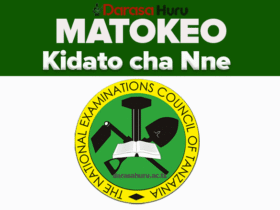




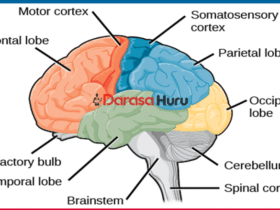



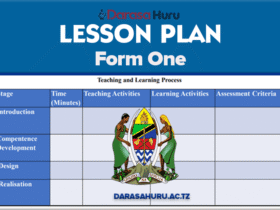

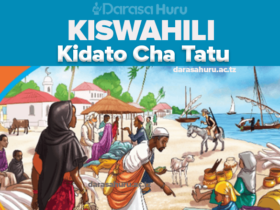

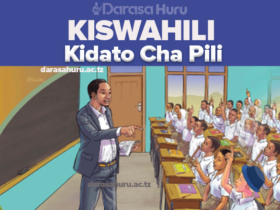


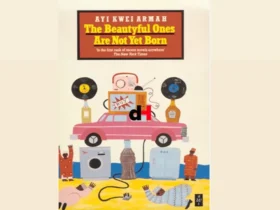
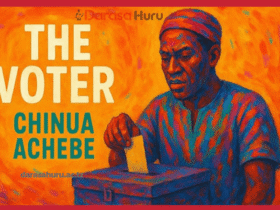

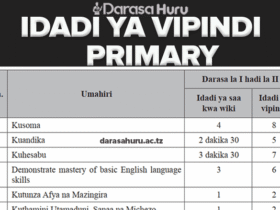
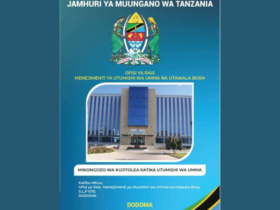
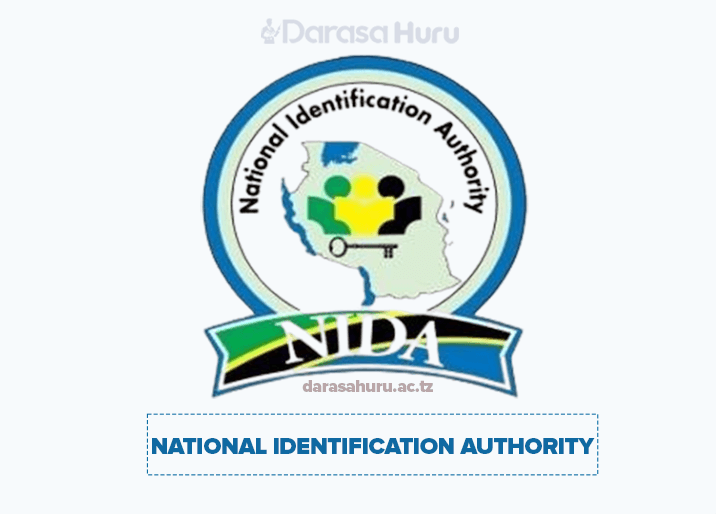

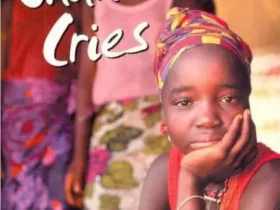



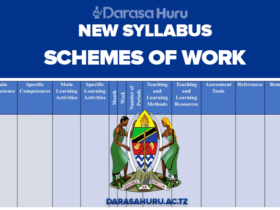







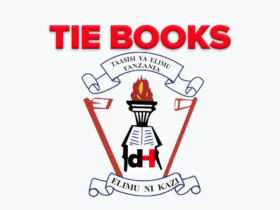

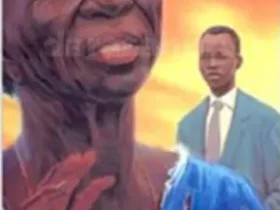
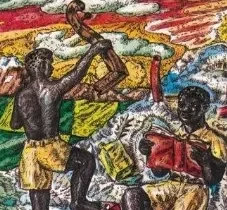
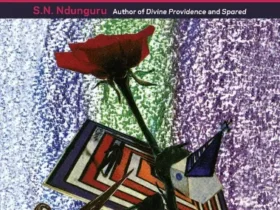
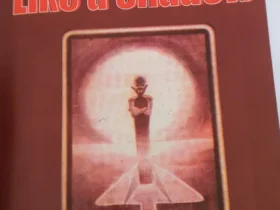
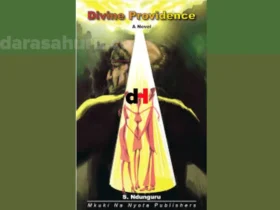
Leave a Reply